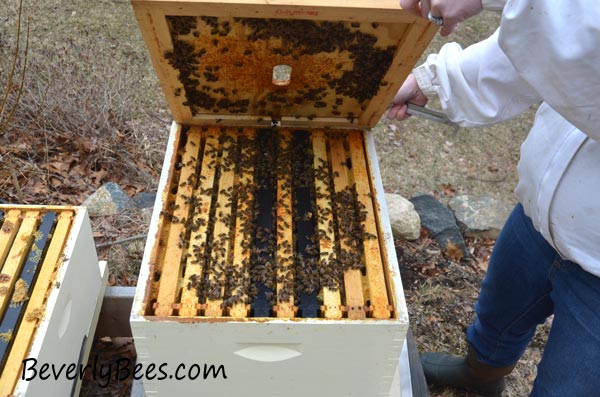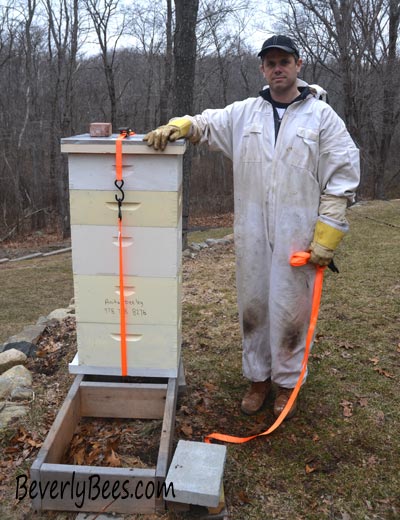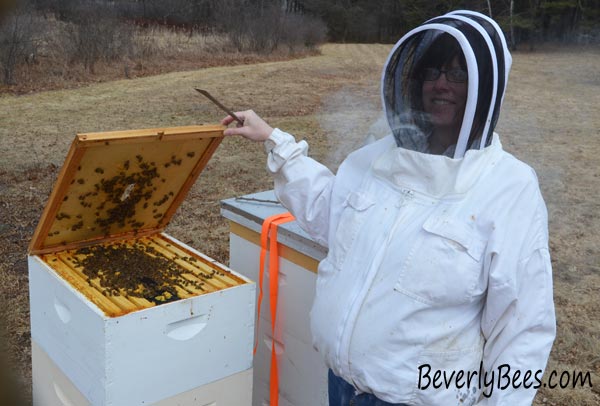It’s Been A Hard Winter For Bees In MA
2013-2014 has been hard winter for bees everywhere and Massachusetts is no exception. I know beekeepers throughout the area who have lost bees, and many have lost all their bees – unfortunately they are not alone. At the Mass Bee meeting a couple of weeks ago, it was mentioned by the head apiary inspector, that he estimated 80% of the bees in MA died this winter. This means MA beekeepers had an average bee winter survival rate of 20%. Based on those stats, anyone in MA who still has bees alive should be very happy!
What about my bee winter survival rate? How did my bees fare?
Last weekend I had a chance to check 4 of my hives. Considering the harsh winter and large colony losses across the state, I am feeling very happy with what I found.

This past winter I was really hard on my bees. The weak ones, were left for dead and the strong were left to prosper. I did not wrap any hives, screened bottom boards were left open all winter long, hives were left buried in snow, insulation did not happen until late December, at which time there had already been many freezing cold days. In January, I started worrying about the nucs I was overwintering, so at the end of the month they were given candy boards, along with 2 full size hives that were struggling in the fall and did not have enough stores to last the winter. None of my other hives were fed anything all season long and had to survive only on what they gathered.

In addition, as some of you know, I do not treat my hives with anything. Nothing goes in the hive that bees don’t put there, except the occasional feeding of struggling colonies. This does not mean I just let bees get sick, which I hear as a criticism of treatment free beekeeping. In many cases mite resistant genetics and hive manipulations can help decrease varroa levels and allow the bees to prosper. Still many treatment free beekeepers can expect to lose 75% of their bees when they first start out, until a localized stock is developed and then survival rates increase.
So I was thrilled when I checked my bees and found three of the four hives were alive, 2 were thriving, 1 was struggling, but that was expected. It had little stores going into winter and was one of the two full size hives given a candy board.

Sadly, the last of the 4 hives was dead from mite related viruses. The genetics of this colony came from a hive that issued 7 swarms last year (I caught 2 and another beekeeper caught 5), and every one of them died along with the original colony, so I think this line of bees was just not “meant to bee” in the first place.
Now For A Surprise and Exciting News!
You may be wondering why I was so hard on my bees. I’m not recommending my method or implying others should try it. The main reason was/is I am expecting a baby boy (#3) any week now.

Last fall I was not feeling well with the pregnancy (I’ll spare you the nauseating details) and did not want to do anything, let alone go anywhere near my hives. After some convincing, my husband helped with them in December and January but that was all those bees were going to get! Taking all this into account the hives still alive are strong survivor bees and need very little coddling. This is something a busy mom and beekeeper can celebrate!
On a related note, Brian and I still have not come up with a name for baby #3 yet, so if you have a good suggestion, please leave it in the comments below!
To find out the latest baby news or how the rest of my bees fared this winter, sign up now for our free email newsletter and check the box weekly blog posts below.
